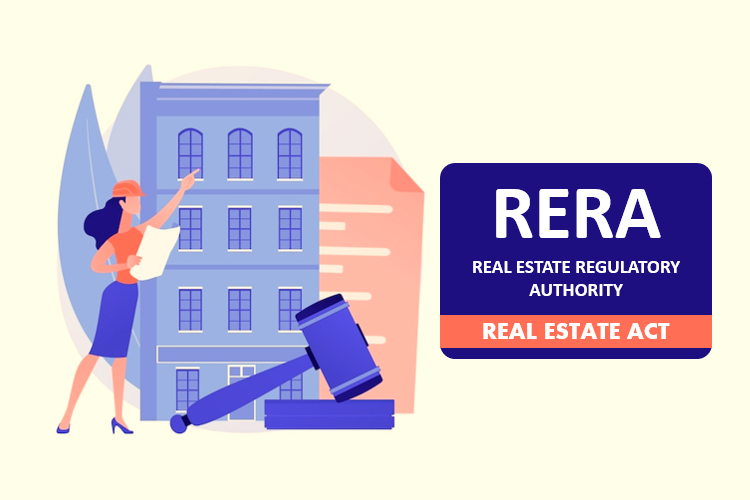RERA is an act for protecting homebuyers and sellers. Here’s how the RERA Act came into existence to benefit homebuyers and sellers and boost real estate investments.
With time we have seen a massive variation in the prices of real estate; however, multiple fluctuations in the industry have affected the purchasing power of the dwellers as well the selling power of the sellers.
Historically there was no standardization of norms in the realty business, and every developer or seller has their norms. The Government of India introduced the Real Estate Regulatory Authority Act to remove such disparity and primarily protect the rights and interests of homebuyers.
RERA Act came into existence on 1st May 2016. Since then, it has ensured efficiency and transparency in the transaction in the real estate sphere. Furthermore, it is crucial to understand that RERA Act has been implemented at the state level, and the elected governing authorities are responsible for registration and approvals and systematic regulation of sale and purchase transactions.
What is RERA Act?
In the realty business, the Real Estate Regulation and Development Act (RERA), 2016 aims to remove the unreasonable activities of promoters and sellers. However, post the commencement of RERA, real estate investment has changed positively and has taken the industry to new heights.
The primary objectives of the RERA Act are:
- Protection of rights and interests of the homebuyers
- Accurate transparency in the transactions
- The requisite flow of information
- Imposition of responsibilities on the builders and promoters
- To elevate the credibility of the Indian Real Estate market
Why is RERA Needed?
Instituting a magnitude of transparency and accountability was the immediate need of the RERA Act concerning the transactions related to the realty business. Here are some of the crucial aspects of why this legislation was needed.
- Real Estate Authority for every state to monitor, adjudicate and arbitrate the disputes
- Encourage fast-track settlements
- Registration of every project following the stipulated guidelines of RERA to ensure proper jurisdiction of the authority
- In the process of transfer or assignment of certain rights and liabilities, proper written approval will be received from RERA
- In case of any default, ensure the liability of the parties to pay the appropriate interest rate.
Benefits of the RERA Act
The RERA Act’s main benefit is establishing a speedy dispute redressal system to effectively and efficiently address every side of the project, i.e. delivery, quality, pricing, etc. Hence, it becomes crucial to understand the benefits linked to RERA Act for buyers, promoters and real estate agents.
-
Standardized Calculation
Before RERA came into motion, there was no standardized pricing placement, which had several repercussions. However, when RERA set formula was introduced, it removed the unpredictability and rapid fluctuations for calculating carpet area. Specifically, the carpet area has been defined under the RERA Act based on which earlier practice of super built-up area was ceased, and the sale can be made only based on the defined carpet area.
-
Certified Quality Standards
With RERA policy of rectifying the damages by the builder was introduced wherein within the timeline of 5 years of possession, if any structural defect has been found builder has to resolve it within 30 days with no extra cost to the buyer. This aspect of the RERA Act obligates the promoter to provide quality developments.
-
Security
It is pertinent to note that if there is any defect in the title at the time of possession, the promoter can claim compensation. Furthermore, if there is an inordinate delay in the possession, a lower amount of interest is not acceptable as both parties have to pay an equal amount of interest in terms of any fault by either of the parties.
Apart from the above advantages concerning security, fake promotions have been mainly minimized because, with RERA, it becomes necessary to provide the registration number.
-
Transparency
Propositions and plans concerning layout, execution, completion and other information about the project can be asked by the buyer as they hold a particular right.
Impact of the RERA Act on Real Estate Business
The realty business has substantially impacted India’s economic growth and hence plays a vital role in its development. However, when historically, there were unnecessary delays in the completion and execution of housing projects, which impacted most of the population. It ruptured the image of the Indian Real Estate sector.
The Real Estate Regulatory Authority (RERA) has set guidelines for maintenance charges in India. According to the rules, maintenance charges can only be charged by developers or builders after the completion of the project and the transfer of the property to the buyers.
The Act has adopted a customer-centric approach and has benefited homebuyers on a large scale.
Homebuyers
- Any delay on the developer’s part can get you compensated in full, and you can also withdraw from the project.
- To perform any amendments to the project, written approval is required, even from the Regulatory authorities.
- No fake advertisements will be done as the project must first register with the appropriate Regulatory Authority.
- Furthermore, as per RERA’s approach, buyers can ask for information related to their project to maintain transparency.
Penalties under RERA
The RERA Act reformed the real estate sector. RERA scrutinizes compliance with the guidelines, and the provisions for penalties have been ingrained.
The regulatory authority for every state has been designated to scrutinize and maintain transparency in realty transactions. Here we will be discussing a few penalties applicable as per RERA Act.
- Breach of contract will be committed upon non-registering the project as per the guidelines of the RERA Act. Ten per cent of the estimated cost and imprisonment of up to three years are the penalties for registration failure.
- A penalty of five per cent can be implied upon the promoter or agent in case of non-compliance with the order directed by the authority.
Section 9(7) of the RERA Act states that the agent registration number will be revoked if the registration has been secured using fraudulent activities or any registration terms has been breached.
- Section 62 of the RERA Act lays down the penalty of RS 10000 per day because of the contravention of Section 9 and Section 10
- Section 65 of the RERA Act says that a penalty of 5% of the cost of the unit sold will be levied if there is any infringement of orders of the RERA Authority.
- Section 66 of the RERA Act states there will be imprisonment of up to 1 year or with a fine extending up to 10 per cent of the cost unit sold if there is any contravention of orders given by the appellate tribunal.
Registration process under RERA
RERA has a state-wise registration methodology, because of which there are variations at every state level. An online process is available at the state’s official site where the process needs to be performed.
This registration applies to the builders as they have to obtain a particular registration number for a particular project (new or ongoing). It is the builder’s responsibility to complete this registration process before its marking or promotion.
Moving ahead with the registration aspect of the RERA Act, the builder has to submit some relevant documents to the regulatory authority along with the application.
-
Registration form
The first step in the registration process is to fill in the registration form and the requisite details and documents to the authority. It is to be noted that the registration form for every state varies from another state.
-
Documents Submission
For promoters and agents, a separate catalogue of documents must be submitted along with the registration form. The documents below are common for all states and should be submitted to the state authority without any failure.
Documents for promoter
- Id and address proof of the promoter
- Email id
- Photographs
- PAN Number
- Commencement Certificate, along with the Sanction Plan,
- Layout Plan
- Legal title deeds consider the title of the promoter of the land on which the project is proposed
- Location details of the project
- Particulars of previous project experience of the promoter, if any
- The plan of action works to be executed in the project
- Availability of Parking slots
Documents for Real Estate Agent
- Id and address proof of the applicant
- Photographs
- Particulars of real estate agent Companies, including name, registered address, MOA, AOA, and type of company
-
Submission of Requisite Fees
Once the documents are submitted, a certain fee as prescribed by the authority regarding RERA guidelines must be paid through demand draft, bankers cheque or Online Payment. There is no fixed price to be paid by the agent or the promoter because it varies from state to state. Also, residential and commercial projects are different hence standardizing the fees for both sectors will be an unfair practice towards the promoter or seller.
-
Review by Authority
The authority will review the application within 30 days from the receipt of the application. Acceptance or rejection of the application will be determined within the above-said period. If no revert is provided within the stipulated time, it is considered that the application has been accepted.
-
Registration Certificate
Registration Certificates will be issued to the promoter or agent once the concerned authority has accepted the application.
Apart from the above-mentioned registration process, it is pertinent to note that under RERA Act, certain projects cannot be registered:
- The land area doesn’t exceed 500 square yards, and only eight apartments exist.
- In situations of renovation, re-development, marketing, advertising etc.
- Where the completion certificate is already available as it was registered before the commencement of the RERA
Complaint aspect as per RERA Act
Under Section 31 of the RERA Act, 2016 complaint can be filed with the Regulatory authority or appropriate adjudicating authority. These complaints can be against the promoter, allottee, agent or builder by the buyer. The legislation differs from state to state, but the complaint process also differs. Some states have specifically prescribed a particular procedure or format for the registration of complaints.
Revocation of RERA Registration
As per the procedure, various compliances must be taken care of by the promoter and agent and by non-complying with them, the registration can be revoked.
- If there is any default by the promoter under RERA
- If any conditions were breached
- If there are any unfair practices adopted by the promoter or agent
- If a promoter or agent is involved in some unfair trade practices.
Commonly Asked Questions About RERA Act
- Which authority is responsible for implementing RERA Act?
Each State and Union Territory in India has its own RERA authority, responsible solely for implementing the RERA Act.
- How does the RERA Act affect the real estate industry?
The RERA Act has increased transparency and accountability in the real estate sector by reducing all fraudulent practices. It also boosted investor confidence and improved buyer sentiments, leading to some of the most significant investments in the real estate industry.
- Can homebuyers file complaints in RERA Act?
Yes, homebuyers can file a complaint with their respective RERA authorities if they face any issues regarding any real estates projects, such as delayed possession, sub-standard construction or any false advertising.
- What is the role of RERA authority in resolving disputes between homebuyers and sellers?
The RERA authority can adjudicate all disputes concerning homebuyers and sellers and impose penalties or compensation in case of non-compliance with the RERA Act.
- How can real estate agents and brokers ensure compliance with the RERA Act?
Real estate agents and brokers can ensure compliance with the RERA Act by registering themselves with the respective state RERA authority, maintaining proper records of transactions, and ensuring transparency in their dealings with homebuyers and sellers.
Conclusion
With the increasing level of unfair trade practices in the realty business, it was necessary to introduce scrutinization at the state level. Risk and uncertainty became the two facets of the real estate domain, and to remove them, legislation impacting every builder and buyer needs to be launched.
Furthermore, the buyer must make their investments wisely. By investing in RERA-registered projects, they entered an ordered and transparent market with a low-risk level and higher investment rates.
Through this government-endorsed legislation, the best developers get recognized by complying with the pillars of transparency, accountability and efficiency.
Virat Agarwal is a highly skilled legal content writer with a passion for crafting compelling and informative articles that educate and engage her readers. With a strong and extensive experience in real-estate research, he has the ability to simplify complex concepts into easy-to-understand language.




